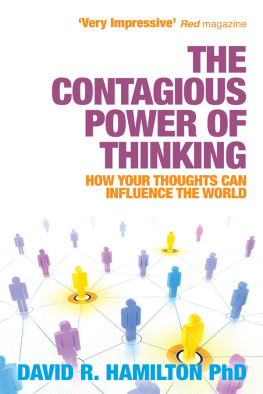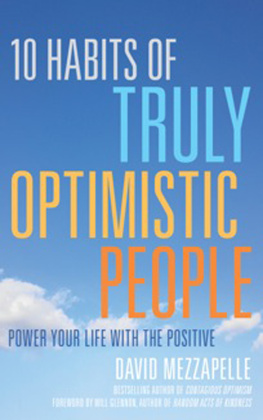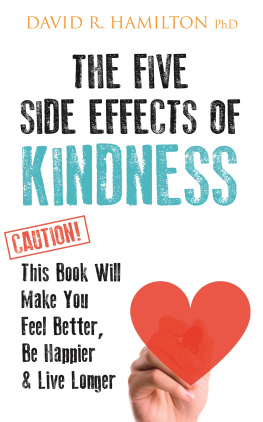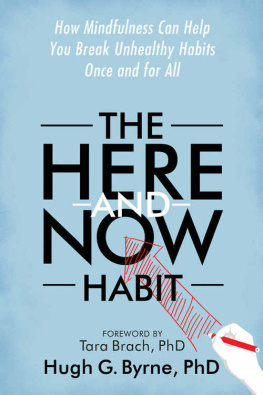
David Hamilton, 2011
The moral rights of the author have been asserted.
All rights reserved. No part of this book may be reproduced by any mechanical, photographic or electronic process, or in the form of a phonographic recording; nor may it be stored in a retrieval system, transmitted or otherwise be copied for public or private use, other than for fair use as brief quotations embodied in articles and reviews, without prior written permission of the publisher.
The author of this book does not dispense medical advice or prescribe the use of any technique as a form of treatment for physical or medical problems without the advice of a physician, either directly or indirectly. The intent of the author is only to offer information of a general nature to help you in your quest for emotional and spiritual well-being. In the event you use any of the information in this book for yourself, which is your constitutional right, the author and the publisher assume no responsibility for your actions.
A catalogue record for this book is available from the British Library.
ISBN 978-1-84850-293-2 in print
ISBN 978-1-84850-562-9 in epub format
ISBN 978-1-84850-561-2 in Mobipocket format
Ubuntu is very difficult to render into a Western language It is to say, My humanity is caught up, is inextricably bound up, in what is yours.
Archbishop Desmond Tutu
I am deeply grateful to my partner, Elizabeth Caproni, for her great patience when she hardly saw me during the last two months of writing this book and also for doing the first edit on every chapter and suggesting valuable content enhancements.
I am also grateful to my friend Bryce Redford for emailing me new studies he stumbled across that were useful in my research.
And I would like to say thank you to my editor, Lizzie Hutchins, for doing some literary sanding, smoothing the rough edges of my writing and making it a little easier on the readers eye.
Thank you also to the staff at Hay House for supporting my development as a writer and teacher and for giving me the opportunity to reach so many people with this book and the ones that came before it.
And Id like to say thank you to the staff of Starbucks in Windsor, the place I call my office, who supplied me with many cups of coffee and a nice atmosphere to write in.
I started writing this book because I wanted to show that kindness was contagious. One kind act, I had found when writing my last book, can inspire another person to perform a kind act, which in turn can inspire another, and so on.
Even though it might sound idealistic, I honestly believe that kindness can make the world a better place. Just as a lily pad in a pond will rise and fall on the wave produced by a pebble dropped in that pond, so acts of kindness will raise the spirits of people we might never know.
I soon realized that this effect isnt limited to acts of kindness. When youre happy, you make others happy. This isnt just because of what you say or because you might be acting a little more exuberantly, its because they sense how you feel and it makes them feel the same way. Happiness is contagious.
Theres nothing spooky about it. We all have cells in the brain called mirror neurons. They cause us to subtly copy the expressions of those around us. If a person is smiling, we smile. If a person is frowning, we frown. And our facial expressions inform our emotional state and so we begin to feel the same emotions as the people we spend time with. We are usually completely unaware that its happening, but the longer were around someone who is happy, the more their happiness will rub off on us.
Sadness and depression flow in the same way. Hanging around someone who is depressed is one sure-fire way to become more depressed yourself. Research at Harvard has even quantified it. If a friend of yours has become depressed for any reason, it increases the likelihood that you will also become depressed by 93 per cent.
You might wonder how they figured this out. They used data from a social network of over 12,000 people and tracked how their mental health changed in response to the mental health changes of their social contacts. It turns out that the chance of catching depression from another person actually depends upon our relationship with them. The stronger the friendship, the greater the contagiousness.
A happy friend can increase the probability of you becoming happy by 25 per cent, but a happy best friend can increase your likelihood by 63 per cent, because youre emotionally closer. Bring on the happy friends!
It turns out that the more friends and social contacts you have, the greater your likelihood of happiness and the lower your likelihood of depression. And because we live in such a socially interconnected world, our emotions dont just affect the people were friends or even acquaintances with. We transmit our mood to our friends friends friends, and they to us.
Emotions also transmit to children and even babies. A mother can pick up on her infants feelings and the infant can also feel the mothers. This is all well and good if a child grows up in a happy household, but if the parents are always fighting then the child will absorb their toxic emotions like a sponge and this will affect its development.
There can be escape in such households to the world of video games, but only if theyre non-violent games. Reams of research now shows that children who play violent video games become more aggressive and show less empathy than children who dont play them.
Through the contagiousness of unhealthy habits, even non-contagious medical conditions can become contagious. Heart disease, for instance, can spread from person to person. It isnt contagious in that it spreads through the transmission of bacteria or a virus; it spreads from mind to mind. All we need to do is copy the unhealthy diet and lifestyle of someone who is preparing for an early grave and we increase the risk that we will follow them.
Fear is also contagious. It can result in mass hysteria, which is actually much more common than you might think. It shows itself on a fairly regular basis, disguised as outbreaks of chemical or food poisoning, when there are no chemicals or bad food, only fear, which spreads from person to person until it infects a whole town.
The workplace provides a fertile ground for the contagion of emotions. Many studies show that the success of teams is heavily influenced by the mood of one or two individuals. If a leader is happy, it can lift the mood of the team, and if they are sad or angry, it can lower the mood.
In fact the moods of leaders are so contagious that they actually affect the bottom line. A study of a large retail chain showed that for each one-point increase in a managers job satisfaction, there was a 5 per cent increase in customer spending.
Can we use this knowledge to make a difference to the world around us? Yes! You only need to flash a smile at someone to raise a smile in them. No matter how hard they may try to resist, smiling is contagious. And according to the facial feedback hypothesis, which postulates that facial movement can affect emotional experience, smiling can actually make us feel happier.
So we can spread happiness just by smiling at people, and of course smiling at yourself in the mirror helps too regardless of how embarrassing that might seem!
There are no isolated acts. We live in an interconnected world where emotions, attitudes and behaviour travel from person to person to person, infecting everyone they touch. And such is the wiring in our brains that we literally sense some of the world through others. In a very real way, other people are extensions of ourselves. We share part of their experience of the world. Its unavoidable.
Next page











